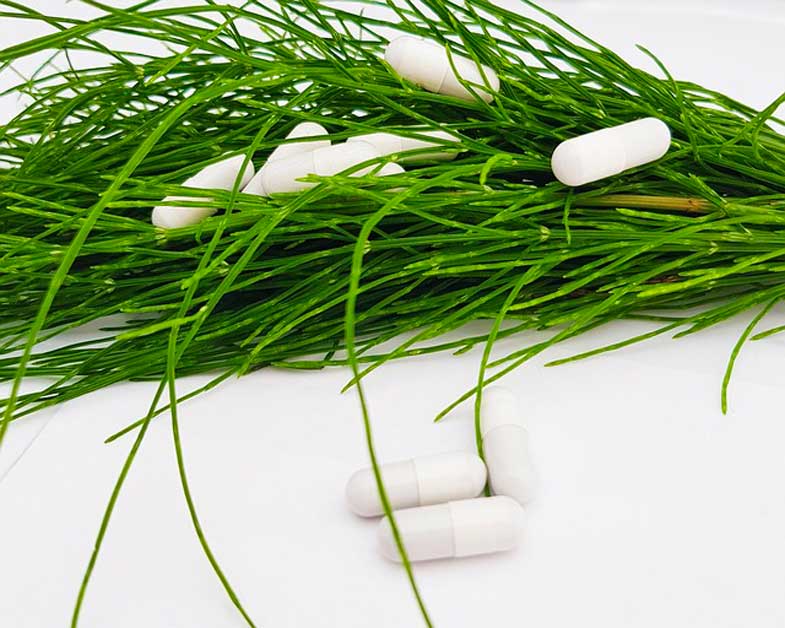Food supplements
Dietary supplements are foods that can be used like medications – it’s all in the dose!

Micronutrient therapy (orthomolecular medicine) serves to optimally supply the body with vital substances
Micronutrient therapy (orthomolecular medicine)
Food supplements: Micronutrient therapy (orthomolecular medicine) serves to optimally supply the body with vital substances that it needs for its diverse cell and organ functions (vitamins, minerals, trace elements, amino acids, fatty acids and secondary plant substances). Some micronutrients can be produced by our body itself, while others must be ingested as natural components of food (=essential substances).
Within the framework of micronutrient therapy, dietary supplements can be used in the form of tablets, coated tablets or powder. However, in case of pronounced deficiency or urgent situations, we also regularly administer the micronutrients intravenously (=directly into the vein) at the THERA Praxisklinik. Read more about this under: Orthomolecular infusion therapy.
Dietary supplements, as the name suggests, should complement food. Above all, they should be safe and have no side effects. In addition to compensating for deficiencies, the benefit of such therapy may also be the reduction of nitrosative or oxidative stress.
How do micronutrient deficiencies occur?
Ideally, a healthy diet ensures that all the nutrients that the body needs are supplied in sufficient quantities. The supply of a balanced, varied and nature-based diet is and remains the best way to a healthy organism. Now, however, there are various reasons why a sufficient supply of nutrients is not always so easy to achieve in today’s world.
Who today can really cook for themselves day after day, using only fresh, unprocessed foods? Between work and the demands that private life also places on us, there is often not enough time for this. Fast food then dominates the menu and ensures a lack of nutrients. But it is not only poor nutrition that makes the use of dietary supplements sensible; special life circumstances with increased requirements can also lead to the body being undersupplied: pregnancy, competitive sports or chronic illnesses are just a few examples.
In addition, our food today is very changed by the food industry and the Western lifestyle. We are experiencing significant nutrient losses due to immature harvesting, long transport routes, specific cultivation methods, climate change and industrial processing.
And as if that were not enough, the food is also provided with countless chemical additives. Conventional fruit and vegetable production works with herbicides, pesticides, and fertilizers (keyword Glyphosate), hormones and antibiotics are used in conventional meat production. The detoxification function of our body must therefore constantly provide maximum performance. For this in turn, the body absolutely needs sufficient micronutrients such as selenium (all detoxification proteins are selenoproteins).
Today, our food supply is diverse.
The quality of our food can be influenced by many factors:
- Industrial food production
- Artificial fertilizers, pesticides, factory farming
- Processed food
- Heating, freezing, drying, preservation, irradiation, blanching, refining, additives, impurities
- long transport routes and storage
- kitchen processing – storing, preparing, cooking, frying, grilling, deep-frying, boiling, microwave processing, baking
Personal strains such as stress, consumption of stimulants or an unbalanced and irregular diet often result in an individual micronutrient requirement. However, long-term medication or an older age also cause an increased need for vital substances.
Food supplements: Additional individual micronutrient requirements may be caused by
- Unbalanced eating habits
- Consumption of high amounts of energy from fat, protein, sugar and alcohol
- Low intake of dietary fiber
- Disturbed acid-base balance
- Special diets or imbalances
- Canteen food – too little fresh fruit and vegetables
- Stimulants – such as tobacco, alcohol, coffee
- Professional or emotional stress
- Lack of sleep
- Competitive sports or heavy physical work
- Pregnancy and lactation
- Resorption disorders due to food intolerances
- Fructose, Gluten, Lactose
- Resorption disorders due to chronic diseases of the digestive tract
- Stomach – gastritis, gastric resection, Zollinger-Ellison syndrome
- Small bowel – Acute and chronic enteritis, radiation enteritis, Crohn’s disease,
Small bowel resection - Large intestine – ulcerative colitis
- Chronic diseases, such as persistent inflammatory situations or cancers
- Long-term drug use
- Malnutrition and undernutrition in old age
- Biochemical individuality – genetically determined different endowment with enzymes, which often results in different sensitivity to pollutants
Food supplements: What are the consequences of micronutrient deficiency?
An insufficient micronutrient supply can lead to disturbed metabolic processes in the body as well as to an increase in free radicals. Free radicals are highly reactive, very aggressive chemical oxygen molecules. They can damage cell envelopes and cell organs (e.g. mitochondria) and thus promote or contribute to the development of various diseases:
- Arteriosclerosis – Coronary heart disease (CHD)
- Cancer
- Rheumatic diseases
- Heart attack, stroke
- Inflammations and disorders of the immune system
- Cataract (cataract)
- Diabetes mellitus – secondary diseases
- Neurodegenerative diseases such as Alzheimer’s disease and Parkinson’s disease
- Periodontitis
- Autoimmune diseases
- Aging processes
- and many others…
An individual laboratory-based micronutrient therapy aims at an optimal supply of your body with all vital micronutrients – according to your individual micronutrient requirements.
At THERA Praxisklinik, micronutrient therapy is embedded in the „Cellsymbiosis“ therapy concept.
Advanced topics (selection):
Your contact persons
Contact and appointment possible at any time
Do one or more of the above points apply to you and would you like to do something for your health? Are you curious? Please feel free to contact us by phone to make an appointment.
You can reach us according to our opening hours at tel. 030 79016533. We look forward to your call or message.











